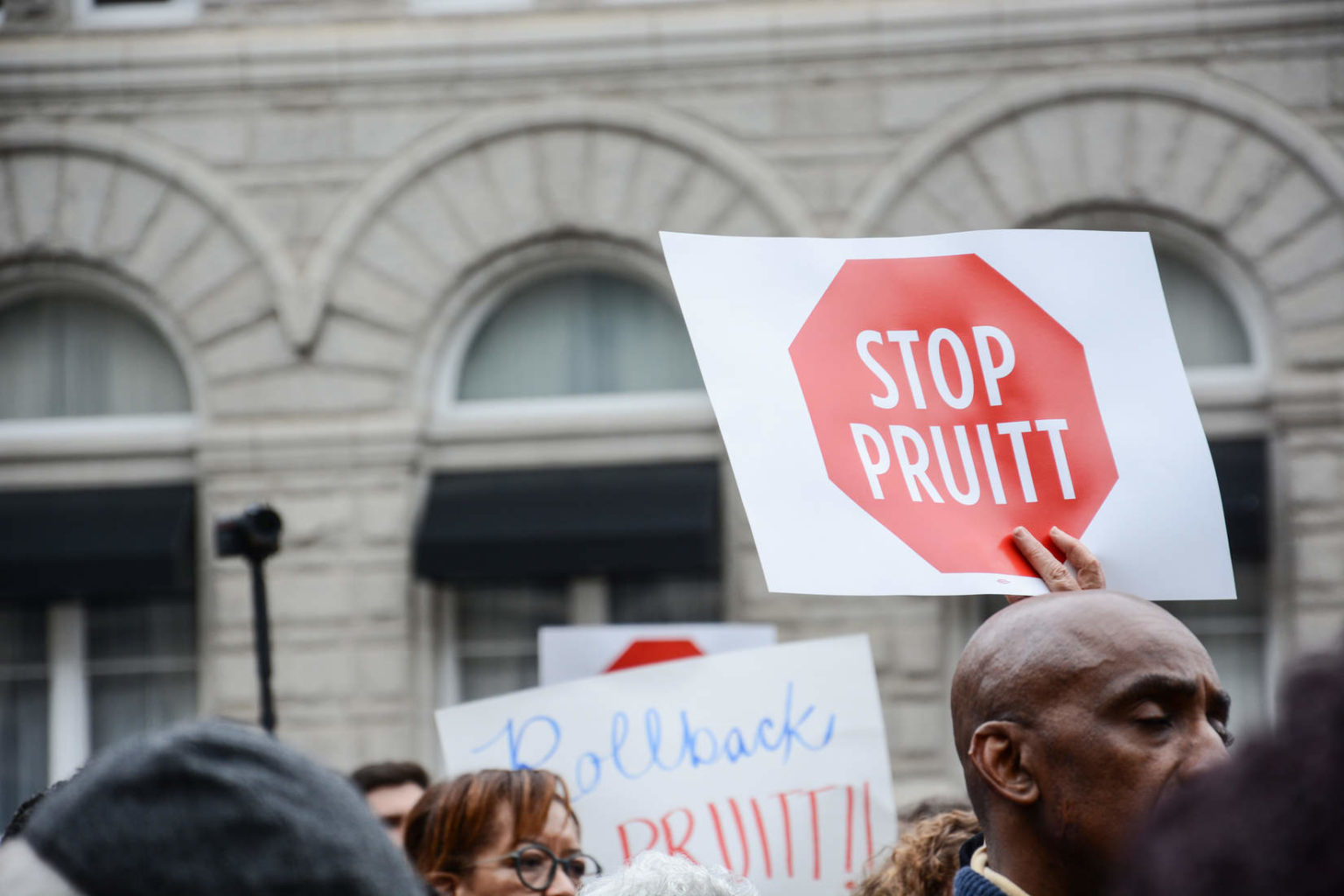It didn’t take long for the first legal challenges be filed against the Trump administration’s recent move to weaken automobile emissions standards. On April 3, the U.S. Environmental Protection Agency (EPA) withdrew the Obama-era decision to retain the greenhouse gas emissions standards for cars and trucks for model years 2022-2025. On Tuesday, 17 states and the District of Columbia sued the agency, challenging Administrator Scott Pruitt’s decision.
The lawsuit is short and direct — only 122 words, including the names of the 17 states — petitioning the District of Columbia Circuit Court to review EPA’s decision under the Clean Air Act.
Pruitt’s decision was immediately applauded by the oil industry and car companies through the powerful Auto Alliance trade group. It was simultaneously bashed by environmental and consumers’ rights groups who criticized the agency for replacing a comprehensive review by the Obama EPA with a shallow analysis that borrowed the auto industry’s talking points.
U.S. EPA cast aside a 1,217-page staff analysis to cite automaker arguments in its official declaration to loosen fuel economy rules https://t.co/d7CkudVEsu
— Camille von Kaenel (@cvonka) April 3, 2018
The legal challenge is the first act in what is likely to be a lengthy, protracted legal battle, pitting states against the federal government, a battle that could grow into a war if the Trump administration follows through with its reported plan to revoke the State of California’s right to enact and enforce its own standards under the Clean Air Act.
This first pushback in the courts was led by California Attorney General Xavier Becerra, and the states signing on represent 44 percent of the country’s population and 43 percent of all new car sales.
California Air Resources Board chair Mary Nichols issued a statement on the filing of the suit, saying:
“The standards we are fighting to protect were adopted in 2012 and don’t take effect until 2022. They were a lifeline thrown to an industry that was in trouble and desperate for stability. They were based on the best judgment of engineers about what technology could achieve. And in fact they are being achieved today, years ahead of the deadlines, because of the good work of the auto industry.
“But now Administrator Pruitt, based on no new information or facts, wants to roll back all that progress in the name of deregulation. The final determination is just the first step, but it is intended to provide the legal basis for a decision that has already been made: to halt the progress that regulators and industry have made toward a new generation of vehicles. It does not withstand scrutiny, and it will not stand.”
The states’ case against Pruitt’s decision was bolstered on May 1 by a report by the Institute for Policy Integrity at NYU School of Law, which eviscerates the EPA’s economic rationales for withdrawing the standards.
“EPA provided no factual basis for its decision to reverse course on emissions standards,” Jeffrey Shrader, economic fellow at the Institute for Policy Integrity and a lead author of the report, said in a statement. “The data supporting the existing standards is robust, and it has not changed significantly since the agency’s thorough review in 2017.”
The report reveals how the EPA mischaracterized or misrepresented data to come to its conclusion. Specifically, the report calls out the agency for:
- Underestimating the fuel savings and fuel cost savings delivered by more efficiency vehicles.
- Misrepresenting the availability and affordability of emissions-reducing technology, including underestimating the availability of electric vehicles and fuel-efficient hybrids.
- Claiming that the standards are not economically feasible for automakers, despite an abundance of evidence that the standards are technologically possible and economically feasible.
- Claiming that the standards will make vehicles less safe without providing any evidence at all that safety will be affected by the standards.
Additionally, the report notes that vehicle affordability “should improve under the standards, partciularly for lower-income households.” This directly contradicts the EPA‘s argument — which is merely an echo of the Auto Alliance’s talking points — that the emissions standards will make vehicles more expensive, and thereby dissuade people from buying new vehicles.
The Institute for Policy Integrity researchers cite a study by Sunapse Energy Economics, that itself was cited by the EPA, which actually shows that over the past decade, the price of entry-level vehicles have remained constant, despite the increases in fuel efficiency and emissions standards. (The study does find an increase in overall prices, but those are heavily weighted towards high-end and luxury vehicles.) In other words, automakers can continue to produce affordable cars for entry-level buyers, while meeting emissions targets.
The timeline for the D.C. Circuit Court’s review of this lawsuit is still unclear.
However, the validity of this particular action by Pruitt’s EPA might be a legal sideshow if the Trump administration decides to go forward with reported plans to stall all fuel efficiency standards at 2021 levels and to detatch greenhouse gas emissions standards (governed by the EPA) from fuel efficiency standards (governed by the Department of Transportation), thereby essentially revoking California’s authority under the Clean Air Act to set its own emissions standards.
The legality of such a plan is suspect — and would likely be tied up in the courts for years. The lawsuit filed this week is likely the first of many legal showdowns between states and the Trump administration on the issue of cleaner cars.
Main image: EPA union rallies outside D.C. headquarters. Credit: AFGE, CC BY 2.0
Subscribe to our newsletter
Stay up to date with DeSmog news and alerts






